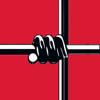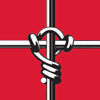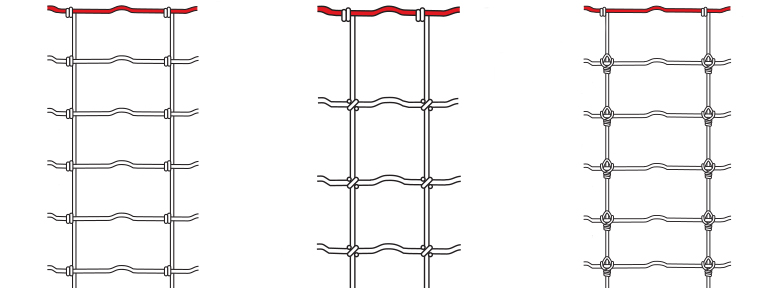When it’s time to put up a new fence on your property, you have a lot to think about. Where will you place the fence? How tall will it be? How large an area will you enclose?
But here’s one question that novice fence builders might not consider: what kind of fence knots will you need?
A fence is only as strong as its weakest link, that’s why it’s important to know how to select the best fence knot for your application. While welded fences can be suitable for gardens and small animals, they simply aren’t tough enough for large animal corrals and containment. For that, you need a woven, or knotted, fence. All of Red Brand’s large animal fencing is made using heavy-gauge wire and knots for strength and durability.
What is a Fence Knot?
These days, most farm or field fencing uses horizonal and vertical wires. This gives you additional protection for keeping your animals in and for keeping predators out. However, these wires need something to hold them in place – which is where fence knots come into play. These knots secure wires at each hinge point, giving your fence extra protection and giving you the peace of mind that comes from having a stable, solid fence.
Different Types of Fence Knots
There are several different types of fence knots, and each has its own unique purpose on your property. Once you understand the various knot options, you can ensure that your fence is perfect for your paddock, cattle enclosure, garden fence, or any other project.
At Red Brand, we manufacture fence using three unique knot styles. Knowing what advantages each offers will help you make a wise decision when purchasing fencing.
 Monarch Knot
Monarch Knot
The monarch knot is also known as a “hinge knot,” because it functions like a hinge in the fence. This knot features a vertical wire that wraps around the horizonal wires at each intersection. This gives the fence exceptional flexibility. It may give a little under pressure, but it always snaps back into place.
This flexibility makes monarch knots ideal for field and farm fencing. The knot is designed to bend – but not break – against animal impacts, so your fence can stand up to cattle leaning on it, skittish horses charging it, and any other shenanigans your animals get up to.
 Square Deal Knot
Square Deal Knot
Also called the “S knot,” the square deal knot is a popular choice for people who want their fence to be extra rigid. This knot uses a small piece of wire to “hug” both the horizonal and vertical wires at each intersection. With this knot in place, your fence will be more resistant to buckling or sagging, and it will even be smooth to the touch.
Square deal knots are perfect for horse “no-climb” fences. The smoothness of the fence eliminates possible spots where a hide can be scrathed or cut, and the rigidity keeps the fence standing, no matter how many animals try to climb it.
 Cross Lock Knot
Cross Lock Knot
A cross lock knot is also called a “fixed knot.” This knot features a piece of wire that is wrapped over the vertical stay line, looped around the horizonal line once on each side, and finally wrapped around the vertical line again. This results in a super-strong knot and a fence that won’t budge.
Cross lock knots are ideal for any area that faces a lot of rough weather. Fences secured by cross lock knots can withstand heavy snow, as well as extreme force from your animals and local wildlife.
Which Fence Knot is Right for Your Project?
The knot that’s right for you will depend on your needs. All three provide exceptional resistance to pressure, but if you expect strong push back from animals or tension from snow drifts, the Cross Lock Knot would be the best option. If you’re installing fence on hilly terrain, the flexibility of the Square Deal Knot works great. For standard uses where you need strength and durability, but not the other advantages, the Monarch Knot works well.

The Importance of Fence Knots
Ultimately, fence knots are tools that help your fence do its job (keeping animals in and keeping predators out). Because each knot has specific strengths, it is very important to consider which knot will be best for your fence. This will help guarantee that your fence suits the task you intended for it.
Do you plan to corral lots of animals in this enclosure? Monarch or square deal knots will be best. Does your property get heavy snow or high winds each year? A cross lock knot is your best option to keep the fence standing. Need to contain your cattle and keep them from the fence line? You’ll want to give barbed wire a try.
But whichever kind of knot you need, you can be sure that you’ll find the right fencing for your project at Red Brand. We’re proud to offer high-quality fencing, tools, and other gear to customers like you – so visit our online store today or find a dealer near you to get the right products for your property.
For more information about Red Brand large animal fencing, visit RedBrand.com.
Don’t miss a thing. Simply fill out the Subscribe form here. We’ll notify you every time we add new material. See you soon!

